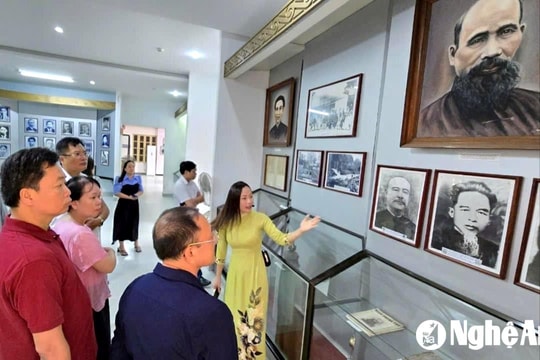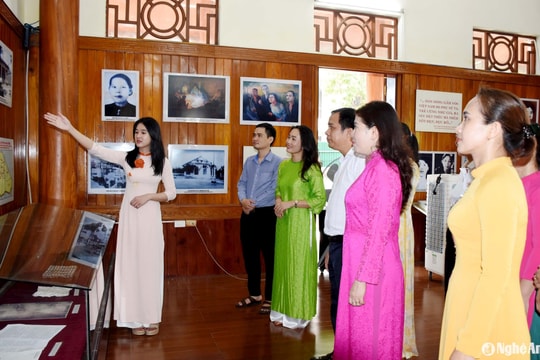Female soldier Nguyen Thi Minh Khai, sacrificed her whole life for the independence of the nation and the happiness of the people.
Comrade Nguyen Thi Minh Khai's real name is Nguyen Thi Vinh, born on November 1, 1910 (some documents say she was born on September 30, 1910) in a small civil servant family in Vinh city. She was an excellent student of President Ho Chi Minh, a female communist soldier who fought and sacrificed her whole life for the revolutionary cause of our Party and nation.
Comrade Nguyen Thi Minh Khai was born in Vinh Yen commune, Vinh city, Nghe An province. Her father, Nguyen Huy Binh, was from Moc village, Nhan Chinh, Hanoi. He worked as a train station clerk in Vinh since 1907. Her mother, Dau Thi Thu, was from Duc Tung, Duc Tho, Ha Tinh. She was a small trader and a hard-working woman who loved her husband and children.
Before 1940, Nguyen Thi Vinh and her family lived at 132 Marechal Foch Street, now Quang Trung Ward, Vinh City, Nghe An, an ancient land with a long history and culture, and a tradition of indomitable patriotism. That cradle became the foundation of patriotism, the source of the resilient and indomitable character in the revolutionary life of comrade Nguyen Thi Vinh - Nguyen Thi Minh Khai.
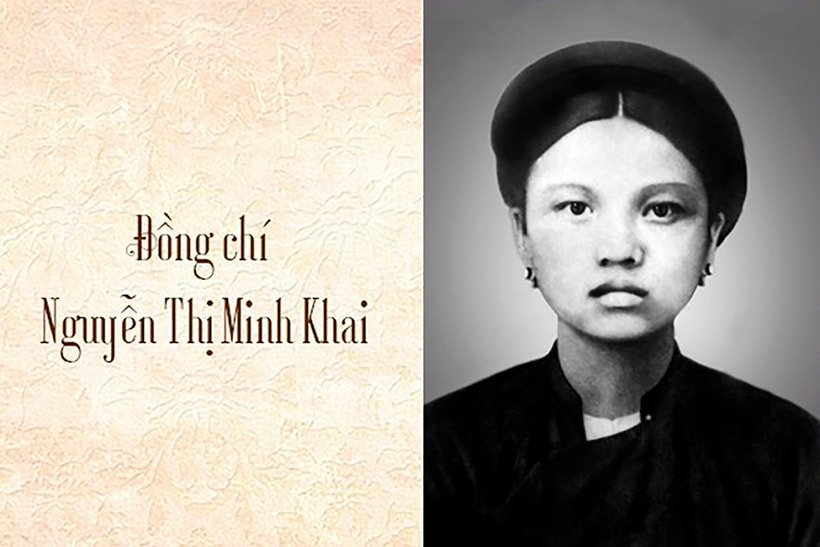
In 1919, Nguyen Thi Vinh was sent by her family to study in the National Language classes, then transferred to the second grade at Nguyen Truong To girls' school in Vinh. During her time studying at this school, she was inspired to fight for the revolution when she heard stories about the heroic and intelligent struggles of the ladies Nguyen Thi Thanh (President Ho Chi Minh's older sister), Nguyen Thi Lan (in Hung Nguyen district)...
In the years 1923 - 1924, the workers' movement in Vinh - Ben Thuy developed strongly in both quantity and quality. Consecutive struggles took place from workers at Truong Thi to workers at the Match Factory and Ben Thuy Electric Plant. In addition, the economic monopoly and political dictatorship of the French imperialists and their feudal lackeys made social conflicts more intense. Those characteristics created a favorable environment to promote patriotic and revolutionary activities of the people of the whole country in general and the people of Nghe Tinh in particular.
In 1924, Nguyen Thi Vinh transferred to first grade at Cao Xuan Duc Primary School, taught directly by comrade Tran Phu.
On July 14, 1925, the Phuc Viet Association was established at Con Meo Mountain, Vinh. Comrade Tran Phu was one of the leading members of the Association. With the purpose of uniting progressive patriotic forces to carry out the revolution to expel the invading imperialists and gain freedom for the nation, the task was to focus on developing the organization in the country, while at the same time establishing contacts with patriotic organizations and individuals abroad. Thanks to the Association's active activities, progressive patriotic ideas were widely disseminated among the people, positively influencing the education of patriotism and hatred of colonial invaders for students, including students at Cao Xuan Duc School, where Nguyen Thi Vinh was studying.
With the encouragement of teacher Tran Phu, student Nguyen Thi Vinh actively participated in patriotic activities of the Patriotic Female Students' Group, the "Revolutionary Student Youth" organization, an organization of outstanding youth and students founded by teachers Tran Phu, Ha Huy Tap, Tran Mong Bach, Phan Kiem Huy. She actively participated in the movement to mobilize female students to contribute money to buy flowers and white cloth to make mourning bands to attend the memorial service of patriotic scholar Phan Chu Trinh, and signed the petition demanding the French colonialists to release Phan Boi Chau. When she left Cao Xuan Duc school, Nguyen Thi Vinh continued to secretly participate in patriotic activities under the guidance of teacher Phan Kiem Huy.
In 1927, thanks to the introduction of Mr. Phan Kiem Huy, Nguyen Thi Vinh was admitted to the Vietnam Revolutionary Party by comrade Dao Xuan Mai (a member of the Vietnam Revolutionary Association in Vinh, later an officer of the General Department of Forestry). To keep it a secret, he changed Nguyen Thi Vinh's name to Nguyen Thi Minh Khai - the name that followed her throughout her life of steadfast revolutionary activities. Nguyen Thi Minh Khai became the first woman to join the Vietnam Revolutionary Party and was assigned to be in charge of mobilizing women and training new party members in the Vinh - Ben Thuy area and the two districts of Nghi Loc and Thanh Chuong.
Thanks to the flexible and in-depth propaganda activities among women, comrade Nguyen Thi Minh Khai mobilized and recruited more women into the Vietnam Revolutionary Party (the new name of the Phuc Viet Association) and they became core cadres, holding important positions in the Nghe Tinh revolutionary movement 1930 - 1931 such as comrades: Ton Thi Que, Nguyen Thi Thiu, Nguyen Thi Nhuan, Nguyen Thi Nha... The number of women after being enlightened by comrade Minh Khai continued to propagate and mobilize other women. Thanks to that, the number of women participating in the revolutionary movement increased day by day, the struggle movement of female workers in Vinh - Ben Thuy became more and more exciting.
In her memoirs about her life of activities, comrade Nguyen Thi Nhuan(1)always have affection and respect for Minh Khai “…During this period, the Vietnam Revolutionary Party (the predecessor of the Tan Viet Party) was active in Vinh. Teacher Tap (Ha Huy Tap) was an active member of theVietnam RevolutionParty at that time. Ms. Minh Khai was now a member.Vietnam RevolutionLater, she became an important cadre of the Tan Viet Party. She was the one who enlightened me and admitted me to Tan Viet.… In December 1927, Ms. Minh Khai introduced and admitted me to the Tan Viet group in Vinh. My organization consisted of five people, three men and two women: me and Ms. Ca Thin. Ms. Minh Khai was my superior…”.
On February 3, 1930, the Communist Party of Vietnam was born, Nguyen Thi Minh Khai was admitted to the Party. From a patriotic soldier, Nguyen Thi Minh Khai officially became a member of the Communist Party of Vietnam, standing side by side with her comrades on the proletarian class's position to fight against the imperialist invaders, to fight for national independence and to liberate the class. She was assigned to a secret agency at Lau restaurant, near Truong Thi Railway Factory, in charge of propaganda work, training party members and workers in the Truong Thi and Ben Thuy areas, and organizing many training courses to train cadres for the Party. In the summer of 1930, with the trust and recommendation of the Central Region Party Committee, headed by comrade Nguyen Phong Sac, comrade Nguyen Thi Minh Khai moved to work in Bac Ky and then continued to be sent to work in China.
Arriving in Hong Kong, China, she changed her name to Duy (A Duy, A Vay), and worked in the Eastern Office of the Communist International, along with comrades Nguyen Ai Quoc and Ho Tung Mau. Nguyen Thi Minh Khai was directly educated by comrade Nguyen Ai Quoc on the basic theories of Marxism-Leninism and secret operations, and was assigned to act as a liaison with the Hong Kong City Committee of the Communist Party of China. Nguyen Thi Minh Khai's important role in the revolutionary organization did not escape the eyes of British, French, and Chiang Kai-shek secret agents. In April 1931, the Party agency in Hong Kong was exposed, and comrade Nguyen Thi Minh Khai was arrested along with 20 other comrades. After being arrested, she still managed to send a small note to comrade Nguyen Ai Quoc: "Even if you are tortured and shackled, you will not confess. Rest assured." As an oath, while in prison, even though the prison guards at Guangzhou prison used all kinds of torture such as beatings, electric shocks, etc., he still maintained his integrity, steadfastly answered "I don't know" and did not reveal anything detrimental to the revolution.
During his three years in prison, Minh Khai lost contact with the Party. In 1933, the Red Relief Association mobilized and intervened to rescue Minh Khai and several other comrades from prison. After his release from prison, he changed his name to Vai and found a way to contact a group of comrades such as Ha Huy Tap, Le Hong Phong, Hoang Van Non, etc. to continue his revolutionary activities. Nguyen Thi Minh Khai was assigned to work in the Party's Command Committee abroad, establishing contacts and rebuilding the Party's revolutionary bases. During this time of sharing hardships, Nguyen Thi Minh Khai developed feelings for and married comrade Le Hong Phong.
In September 1934, in recognition of her active activities in the Party's Command Committee abroad, Nguyen Thi Minh Khai was appointed to join the Party delegation to attend the 7th Congress of the Communist International. While waiting for the Congress, comrade Nguyen Thi Minh Khai, with the alias Phan Lan, was admitted to study and further hone her theory at the Oriental University (January 1935).

On the afternoon of July 25, 1935, the 7th Congress of the Communist International officially opened. He represented Vietnamese women to read a speech on the role of Indochinese women and Vietnamese women in the new historical era: “…Especially during the revolutionary climax in Indochina, women participated significantly in the revolutionary struggle. They participated in demonstrations and led some of them, gave speeches at rallies, many times women bravely went to the forefront of demonstrations and the soldiers had to retreat and agree…”(2).This was the first time on the International Communist forum that an Oriental woman, a female party member in Vietnam, spoke out loudly to expose the French colonialists' policy of aggression against Indochina, denounced the brutal crimes of the invaders, and promoted the revolutionary fighting spirit of Indochinese women, in which Vietnamese women made an important contribution.
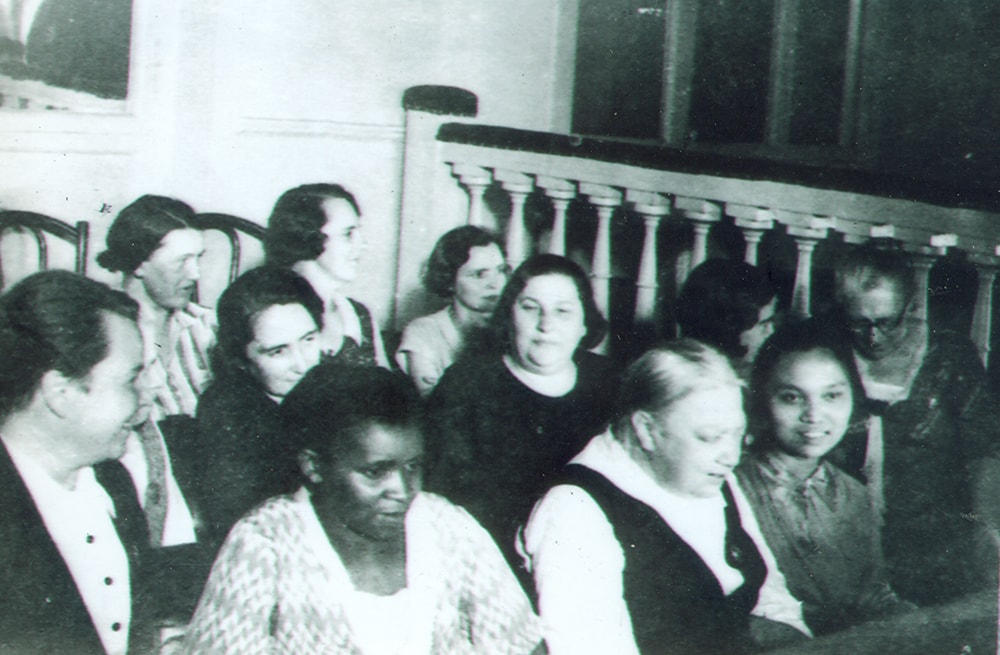
At the end of 1936, Nguyen Thi Minh Khai returned to work in the South and met with General Secretary Ha Huy Tap and the Party Central Committee to convey the new directive of the Communist International. She was assigned to work in Saigon. In 1937, she took the alias "Bay Khai", "Nam Bac", was elected to the Southern Regional Party Committee and was the female Secretary of the Saigon - Cho Lon City Party Committee. Taking on a new task in a difficult and dangerous situation, having to operate secretly, she flexibly applied the theories as well as practical experience accumulated during her time working abroad to lead the struggles of workers and women.
Besides, he always stayed close to the base, opened many secret classes to train cadres, fought against Trotsky and reformist nationalist forces. He also wrote many articles and discussions to propagate the issue of women's liberation, calling on women to join the struggle in the People's newspaper under the pen name Kim Anh... Everyone from workers to intellectuals when working with Minh Khai admired his theoretical level and leadership ability. Thanks to that, the revolutionary movement in Saigon developed more and more strongly.
While the revolutionary movement was developing strongly in the whole country, on June 22, 1939, Nguyen Thi Minh Khai was shocked to receive the news that comrade Le Hong Phong had been tracked down and arrested by French secret police (according to the report of the French secret police in Vinh sent to the Chief of the Central Police Department and Central Secret Police in Hue in December 1939, the file is kept at the Central Archives). Suppressing her grief and worrying about her life partner, comrade Nguyen Thi Minh Khai continued to fulfill her mission of leading the Saigon - Cho Lon revolution. In early 1940, she gave birth to a baby girl named Le Nguyen Hong Minh, a combination of Nguyen Thi Minh Khai and Le Hong Phong. After Hong Minh's birth, she sent her child to the revolutionary base to continue the struggle for national liberation.
On July 30, 1940, he was arrested by the French colonialists at Nga Sau, Binh Dong, after attending a meeting of the Southern Regional Party Committee. In the August 1940 Political Report of the Governor of Southern Vietnam, file IIA45/204(2), the Southern Governor's Office wrote about Nguyen Thi Minh Khai "as the mastermind in the activities of the Indochinese Communist Party, including organizing the anti-militarist campaign, preparing for an armed uprising and sabotage movement...".
.jpg)
Knowing that he was the Secretary of the Saigon - Cho Lon Party Committee, playing an important role in the Southern Regional Party Committee, the French colonialists took Minh Khai to the Saigon Central Prison and brutally tortured him in order to extract information. Despite the enemy's whips on her body, which seemed to be half dead, Nguyen Thi Minh Khai still upheld the revolutionary spirit. In prison, she continued to mobilize her sisters to fight, and she used her blood to write poems and slogans on the cell walls to uphold the spirit of a communist soldier.“Do not admit or confess. Confessing will help the enemy.”or:
"We have shouldered the burden of life together
Where is the dust to watch?
The main prison for self-improvement
Prison is a place of rest
Whether beaten or hung, the more determined
Whether using pliers or clamps, the words will not be wrong
Sacrifice and strive for the mission
"Practice thoroughly until death."
Realizing that the whip could not subdue the comrade, after knowing that Minh Khai was the wife of comrade Le Hong Phong, the French colonialists used tricks to put the two of them in prison together. Although the couple had not seen each other for a long time, the two comrades still tried to suppress their private feelings, resolutely refused to admit or confess, and steadfastly fought against the enemy's evil plot. All the French colonialists received was a resolute answer from the comrade: "I do not know this person."
Although imprisoned in the imperial prison, comrade Nguyen Thi Minh Khai, as Secretary of the Saigon - Cho Lon City Party Committee, still tried to contact her comrades to lead the revolutionary movement in the South. In Circular No. 7709-S of Chanh Liem Phong P. Arnoux in 1940 sent to the Governor of the South, Inspector General Liem Phong mentioned that “…When searching Nguyen Thi Minh Khai while transferring her, two handwritten documents were discovered in her clothes. The first document was a call for soldiers, workers and farmers of Indochina to unite to launch a revolution and fight for liberation with the support of the Soviet Union. The second document was a letter signed by Ho Thi Duc, a political prisoner, to the comrades, with a passage implicitly requesting that the readers increase communist propaganda. The fact that this letter was discovered in the hands of Nguyen Thi Minh Khai proves that this soldier was responsible for communicating with the outside of the prison…”(3). The colonial court then sentenced many communist soldiers to death, including comrade Nguyen Thi Minh Khai. The Saigon military court on March 25, 1941 and April 3, 1941 sentenced her to 12 sentences: 2 death sentences, 2 life sentences, 2 sentences of 20 years in prison, 1 sentence of 15 years in prison, 5 sentences of 5 years in prison. In the enemy's court, she not only did not submit but also boldly questioned them: "My country, saving the country is a crime, is stealing the country not a crime?".
Unable to subdue the female Secretary of the Saigon - Cho Lon Party Committee, a staunch communist, on August 28, 1941, the French colonialists took comrade Nguyen Thi Minh Khai and comrades Ha Huy Tap, Nguyen Van Cu... to be shot in Hoc Mon (Saigon). Nguyen Thi Minh Khai took advantage of the last time of her life to secretly write on a small piece of paper rolled up in a cigarette and sent it to her comrade, her life partner Le Hong Phong, who was being exiled in Con Dao prison: "Even if I die, I promise you, I will be faithful to the revolution, loyal to the Party. I promise to always be a staunch communist. I hope you will be the same."(4).
Before going to the execution ground, knowing that she would die, that she would no longer be able to devote her youth and efforts to the revolution, under the enemy's guns, comrade Nguyen Thi Minh Khai did not let them blindfold her and shouted the slogan: "Long live the Indochinese Communist Party! Long live the success of the Indochinese Revolution!". Nguyen Thi Minh Khai heroically sacrificed herself at the age of 31, when her youth and revolutionary spirit were still burning within her.
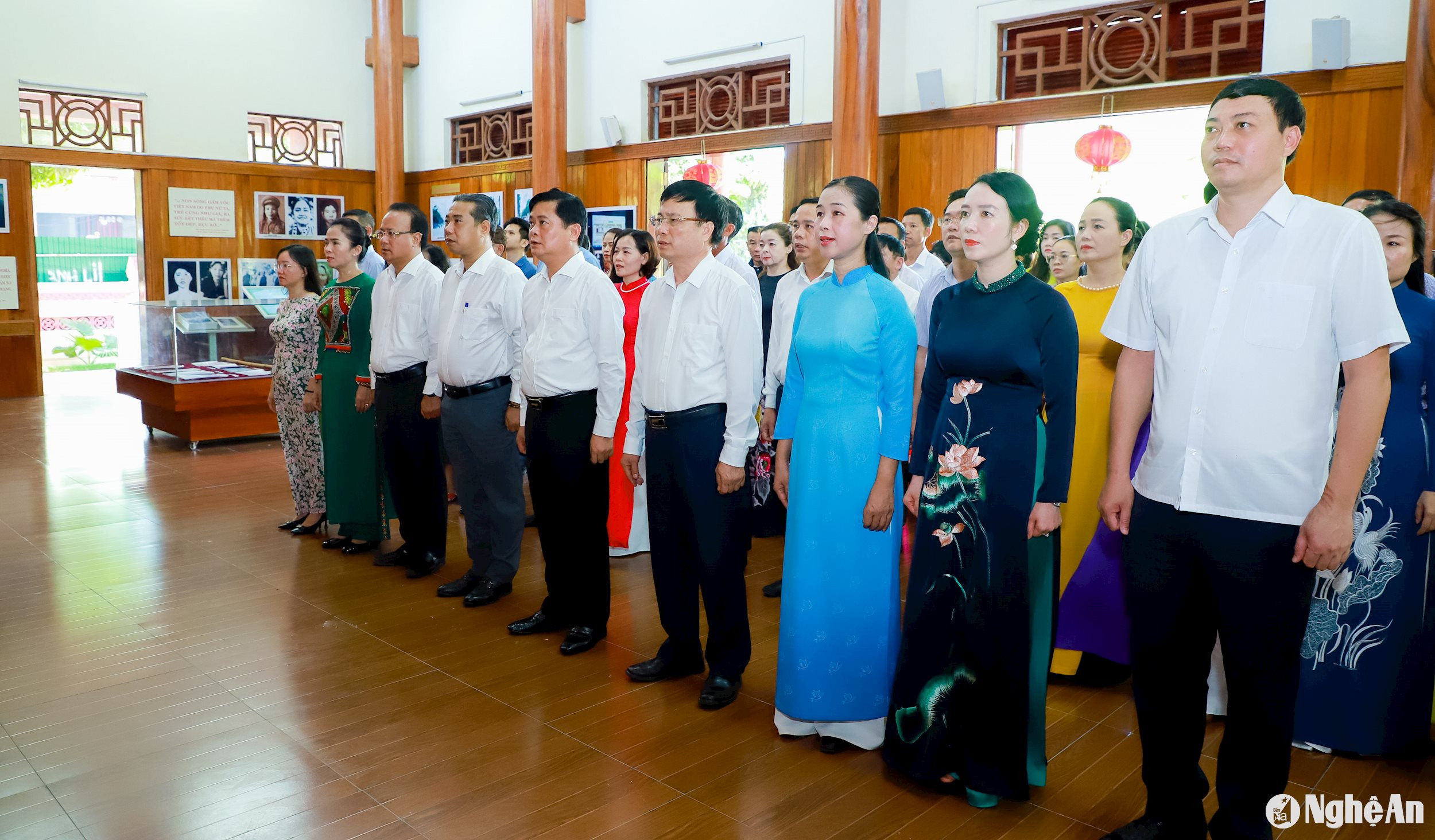
Comrade Nguyen Thi Minh Khai is a typical example of a female communist soldier from her hometown Nghe An. She sacrificed her personal happiness for the goal of national liberation and independence and freedom for the country. Her life, her steadfast and tireless fighting spirit for the revolutionary cause of the nation, for the cause of women's liberation, and her heroic poems are examples for generations of soldiers to follow:
Be steadfast and courageous, everyone!
Patience makes a great man.
Times push the soldier,
The revolutionary path is still thorny./.
Note
(1) Nguyen Thi Nhuan: hometown in Phu Long Commune, Hung Nguyen District, Nghe An, pre-uprising cadre, was in charge of Communications and Transport, President of the Vinh City Democratic Women's Association, member of the Vinh City Viet Minh Committee, 76-year Party membership badge
(2) Nghe An - Communist examples, Nghe An Publishing House 1998, pp. 85-86
(3) Documents stored at the Security Professional Records Department, Ministry of Public Security
(4) Nghe An - Communist role models, volume 1, Nghe An Publishing House, 1998, p.90

